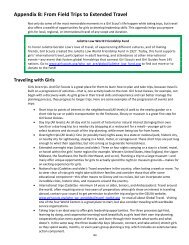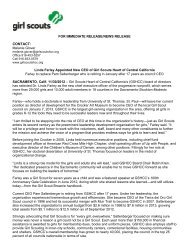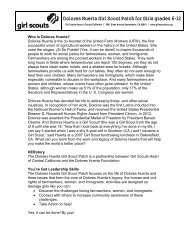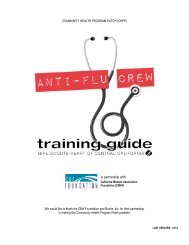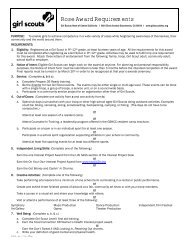Dolores Huerta Biography - Girl Scouts Heart Of Central California
Dolores Huerta Biography - Girl Scouts Heart Of Central California
Dolores Huerta Biography - Girl Scouts Heart Of Central California
Create successful ePaper yourself
Turn your PDF publications into a flip-book with our unique Google optimized e-Paper software.
<strong>Dolores</strong> <strong>Huerta</strong> <strong>Biography</strong><br />
<strong>Girl</strong> <strong>Scouts</strong> <strong>Heart</strong> of <strong>Central</strong> <strong>California</strong> I 6601 Elvas Avenue Sacramento, CA 95819 I www.girlscoutshcc.org<br />
Childhood and Family<br />
<strong>Dolores</strong> <strong>Huerta</strong> is the President of the <strong>Dolores</strong> <strong>Huerta</strong> Foundation, and the co-founder<br />
and First Vice President Emeritus of the United Farm Workers of America, AFL-CIO (UFW).<br />
She is the mother of 11 children, 14 grandchildren and six great-grandchildren. <strong>Dolores</strong> has<br />
played a major role in the American civil rights movement.<br />
<strong>Dolores</strong> <strong>Huerta</strong> was born on April 10, 1930 in the mining town of Dawson, in northern<br />
New Mexico, where her father, Juan Fernandez, was a miner, field worker, union activist and<br />
State Assemblyman. Her parents divorced when she was three years old. Her mother, Alicia<br />
Chavez, raised <strong>Dolores</strong>, along with her two brothers, and two sisters, in the San Joaquin valley<br />
farm worker community of Stockton, <strong>California</strong>. She was a businesswoman who owned a<br />
restaurant and a 70-room hotel. <strong>Dolores</strong>’ mother was a major influence in <strong>Dolores</strong>’ life. She<br />
taught <strong>Dolores</strong> to be generous and caring for others. She often put up farm workers and their<br />
families for free in her hotel. She was also a community activist, and supported <strong>Dolores</strong> and<br />
her <strong>Girl</strong> Scout troop.<br />
<strong>Dolores</strong>’ <strong>Girl</strong> Scout Experience<br />
<strong>Dolores</strong> was a member of <strong>Girl</strong> Scout Troop 8, in Stockton, <strong>California</strong> from the age of 8<br />
until 18. As a <strong>Girl</strong> Scout, <strong>Dolores</strong>’ troop took on many community endeavors, including<br />
fundraising activities to support the USO during Word War II. <strong>Dolores</strong>’ troop was quite unique<br />
for its time in that it was truly representative of the international community of Stockton. It was<br />
made up of girls from diverse ethnic backgrounds, including African-American, Chinese,<br />
Filipino, Latino, and Anglo at a time when racism was prevalent. In March of 2006, <strong>Dolores</strong><br />
said this about her <strong>Girl</strong> Scout experience, “Being a <strong>Girl</strong> Scout from the time I was eight to<br />
eighteen taught me many things. It helped build my self-confidence, and taught me not to be<br />
shy about speaking in public. I learned to be proud of the things I did in earning <strong>Girl</strong> Scout<br />
badges. The <strong>Girl</strong> <strong>Scouts</strong> also taught me about moral values. I had a wonderful <strong>Girl</strong> Scout<br />
leader, Miss Kathryn Kemp, who taught us how to work as a team. Our troop was made up of<br />
girls from various ethnic groups. As <strong>Girl</strong> <strong>Scouts</strong>, many of us were given opportunities that we<br />
would not have had otherwise, such as camping. Being together, we learned about each<br />
other’s cultures. These were good lessons as a life experience. We would never have learned<br />
about diversity otherwise.” In her youth, <strong>Dolores</strong> also played the violin and enjoyed dancing,<br />
including performing tap, ballet, and folklorico.<br />
First Experiences of Racism<br />
It was as a teenager in high school that <strong>Dolores</strong> first experienced racism. An annual<br />
national <strong>Girl</strong> Scout essay contest was held, and <strong>Dolores</strong> was one of two girls who won. She<br />
placed second throughout the nation. The second place prize was a trip to the Hopi Indian<br />
Reservation in Gallup, New Mexico. When <strong>Dolores</strong> sought time off from school to go on this<br />
trip, she was granted permission from all of her teachers, but denied the time off from school<br />
by the Dean of <strong>Girl</strong>s. <strong>Dolores</strong> felt that this was because she was a Latina. Many Anglo girls<br />
had previously been given the time off from school to take early vacations. <strong>Dolores</strong> also<br />
experienced more institutional racism when, in that same senior year of high school, she was<br />
given a final grade of a “C” in English, after receiving numerous “A’s” on term papers, reports,<br />
and essays. When she approached her teacher in regard to her final grade, the teacher told
her that she had given her the “C” because she “knew” that the essays and reports were<br />
written by someone else because <strong>Dolores</strong> could not have written them herself.<br />
Early Community Organizing<br />
After high school, <strong>Dolores</strong> attended Delta Community College and received a teaching<br />
certificate. She was the first of her family to receive a higher education. Her brother, John,<br />
also became a teacher under the G.I. bill after she did. <strong>Dolores</strong> taught grammar school, but<br />
decided to resign from teaching because, in her words, “I couldn’t stand seeing farm worker<br />
children come to class hungry and in need of shoes. I thought I could do more by organizing<br />
farm workers than by trying to teach their hungry children.”<br />
In 1955, she was a founding member of the Stockton Chapter of the Community Service<br />
Organization (CSO), a grass roots organization started by Fred Ross, Sr. The CSO battled<br />
segregation and police brutality, led voter registration drives, pushed for improved public<br />
services and fought to enact new legislation. While working for the CSO, recognizing the<br />
needs of farm workers, <strong>Dolores</strong> organized and founded the Agricultural Workers Association in<br />
1960, which later became the Agricultural Workers Organizing Committee. She became a<br />
fearless lobbyist in Sacramento, at a time when few women, not to mention women of color,<br />
dared to enter the state and national capitols to lobby predominantly white, male legislators.<br />
Her efforts met with success in 1961, when she obtained the removal of citizenship<br />
requirements from pension and public assistance programs for legal residents of the U.S. She<br />
was also instrumental in the passage of legislation allowing citizens the right to vote in<br />
Spanish, and the right of individuals to take the drivers license examination in their native<br />
language. In 1962, she lobbied in Washington D.C. for an end to the “captive labor” Farm<br />
Worker Bracero Program. In 1963, she was instrumental in securing Aid for Families with<br />
Dependent Children, for the unemployed and under-employed, and disability insurance for<br />
farm workers in the State of <strong>California</strong>.<br />
A Union for Farm Workers<br />
It was through her work with Fred Ross, Sr. and the Community Service Organization<br />
(CSO), that <strong>Dolores</strong> met Cesar Chavez. It was Fred who recruited both <strong>Dolores</strong> and Cesar,<br />
and trained them in community organizing. While Cesar and <strong>Dolores</strong> were working for the<br />
CSO, they both realized the immediate need to organize farm workers because of their terrible<br />
living and working conditions. In 1962, Cesar, who was the national director of the CSO,<br />
requested that the CSO organize farm workers. The CSO convention turned down Cesar’s<br />
request. Cesar and <strong>Dolores</strong> resigned from their jobs with the CSO to organize the farm<br />
workers union. At that time, <strong>Dolores</strong> was a divorced, single mother with seven children.<br />
<strong>Dolores</strong> joined Cesar and his family in Delano, <strong>California</strong>. There they formed the National Farm<br />
Workers Association, the predecessor to the United Farm Workers (UFW).<br />
By 1965, <strong>Dolores</strong> and Cesar had organized farm workers and their families throughout<br />
the San Joaquin Valley utilizing organizing techniques taught to them by Fred Ross. On<br />
September 8 th of that year, Filipino members of another farm worker group, the Agricultural<br />
Workers Organizing Committee, demanded higher wages and struck Delano area grape<br />
growers. Although <strong>Dolores</strong> and Cesar had planned to organize farm workers for several more<br />
years before confronting the large corporate grape industry, they could not ignore their Filipino<br />
brothers’ request. On September 16, 1965, the National Farm Workers Association voted to<br />
join in the strike. Over 5,000 grape workers walked off their jobs in what is now known as the<br />
famous “Delano Grape Strike.” The two organizations merged in 1966 to form the United Farm<br />
Workers Organizing Committee, which later became the United Farm Workers (UFW). The<br />
strike would last five years.<br />
2
Union Contracts, Boycotts, and Legislation<br />
In 1966, <strong>Dolores</strong> negotiated the first contract with the Schenley Wine Company. This<br />
was the first time in the history of the United States that a negotiating committee comprised of<br />
farm workers, and led by a woman, negotiated a collective bargaining agreement with an<br />
agricultural corporation. The grape strike continued and <strong>Dolores</strong>, as the main negotiator, not<br />
only successfully negotiated more contracts for farm workers, she also set up hiring halls and<br />
farm worker ranch committees, administered contracts, and conducted over one hundred<br />
grievance and arbitration procedures on the workers behalf.<br />
These union contracts established the first health and benefit plans for farm workers.<br />
<strong>Dolores</strong> spoke out early and often against toxic pesticides that threaten farm workers,<br />
consumers, and the environment. The early agreements required growers to stop using such<br />
dangerous pesticides as DDT and Parathion. They also provided the first toilets in the fields,<br />
cold drinking water and individual drinking cups, and rest periods for farm workers. <strong>Dolores</strong><br />
continued to lobby in Sacramento, CA. and Washington D.C., organized field strikes, directed<br />
UFW boycotts, and led farm workers campaigns for political candidates. As a legislative<br />
advocate, <strong>Dolores</strong> became one of the UFW’s most visible spokespersons. Robert F. Kennedy<br />
acknowledged her help in winning the 1968 <strong>California</strong> Democratic Presidential Primary<br />
moments before he was assassinated in Los Angeles.<br />
<strong>Dolores</strong> directed the UFW’s national grape boycott, which lasted from 1965 to 1970.<br />
This historic boycott resulted in the entire <strong>California</strong> table grape industry signing a three-year<br />
collective bargaining agreement with the United Farm Workers in 1970. The UFW continued to<br />
organize not only the grape workers, but the workers in the vegetable industry as well. In 1973,<br />
the grape contracts expired and the grape growers, instead of renegotiating contracts with the<br />
UFW, signed sweetheart contracts with the Teamsters Union without the farm workers’<br />
consent. <strong>Dolores</strong> organized picket lines until violence erupted and two farm workers were<br />
killed. Once again the UFW turned to the non-violent consumer boycott. <strong>Dolores</strong> directed the<br />
east coast boycott of grapes, lettuce, and Gallo wines. The boycott resulted in the enactment<br />
of the Agricultural Labor Relations Act of 1975, the first law of its kind in the United States,<br />
which granted farm workers the right to collectively organize and bargain for better wages and<br />
working conditions. As part of her on-going lobbying efforts, <strong>Dolores</strong> lobbied against federal<br />
guest worker programs, and spearheaded legislation granting amnesty for farm workers that<br />
had lived, worked, and paid taxes in the United States for many years, but were unable to<br />
enjoy the privileges of citizenship. This resulted in the Immigration Act of 1985 in which<br />
1,400,000 farm workers received amnesty.<br />
Recognitions and the <strong>Dolores</strong> <strong>Huerta</strong> Foundation<br />
For more than thirty years <strong>Dolores</strong> <strong>Huerta</strong> remained Cesar Chavez’ most loyal and<br />
trusted advisor until his death in 1993. Together they founded the Robert Kennedy Medical<br />
Plan, the Juan De La Cruz Farm Workers Pension Fund, and the Farm Workers Credit Union,<br />
which were the first medical plan, pension plan, and credit union for farm workers. They also<br />
formed the National Farm Workers Communications organization with five Spanish radio<br />
stations.<br />
As an advocate for farm workers rights, <strong>Dolores</strong> has been arrested twenty-four times for<br />
non-violent peaceful union activities. Among her many awards, in 1984, the <strong>California</strong> State<br />
Senate bestowed upon her the Outstanding Labor Leader Award. In 1998, <strong>Dolores</strong> received<br />
the United States’ Eleanor D. Roosevelt Human Rights Award from President Clinton. In 1993,<br />
<strong>Dolores</strong> was inducted into the National Women’s Hall of Fame. That same year she received<br />
3
the American Civil Liberties Union (ACLU) Roger Baldwin Medal of Liberty Award, the Eugene<br />
V. Debs Foundation Outstanding American Award, and the Ellis Island Medal of Freedom<br />
Award. She is also the recipient of the Consumers’ Union Trumpeter’s Award. In 1998, she<br />
was one of the three Ms. Magazine’s “Women of the Year”, and the Ladies Home Journal’s<br />
“100 Most Important Women of the 20 th Century.” <strong>Dolores</strong> has also received the OHtli Award<br />
from the Mexican government. On December 8, 2002 she received the Nation/Puffin Award<br />
for Creative Citizenship. In 2012, <strong>Dolores</strong> was presented with the Presidential Medal of<br />
Freedom by President Barack Obama.<br />
<strong>Dolores</strong> has received nine honorary doctorate degrees from universities throughout the<br />
United States, the latest one from Princeton University, and two recognition awards from<br />
Harvard University. There are five elementary schools and one high school named in her<br />
honor, including the <strong>Dolores</strong> <strong>Huerta</strong> Elementary School in Stockton, CA. At 79, <strong>Dolores</strong> <strong>Huerta</strong><br />
still works long hours. Many days find her in cities across North America promoting “ La<br />
Causa,” the farm workers cause, and educating the public on public policy issues affecting<br />
immigrants, women, and youth. <strong>Dolores</strong> is a board member for the Fund for the Feminist<br />
Majority that advocates for political and equal rights for women. She is President of the<br />
<strong>Dolores</strong> <strong>Huerta</strong> Foundation whose mission is to establish Communities In Action by focusing<br />
on community organizing and leadership development in low-income and under-represented<br />
communities.<br />
@2009 <strong>Dolores</strong> <strong>Huerta</strong> Foundation<br />
4



